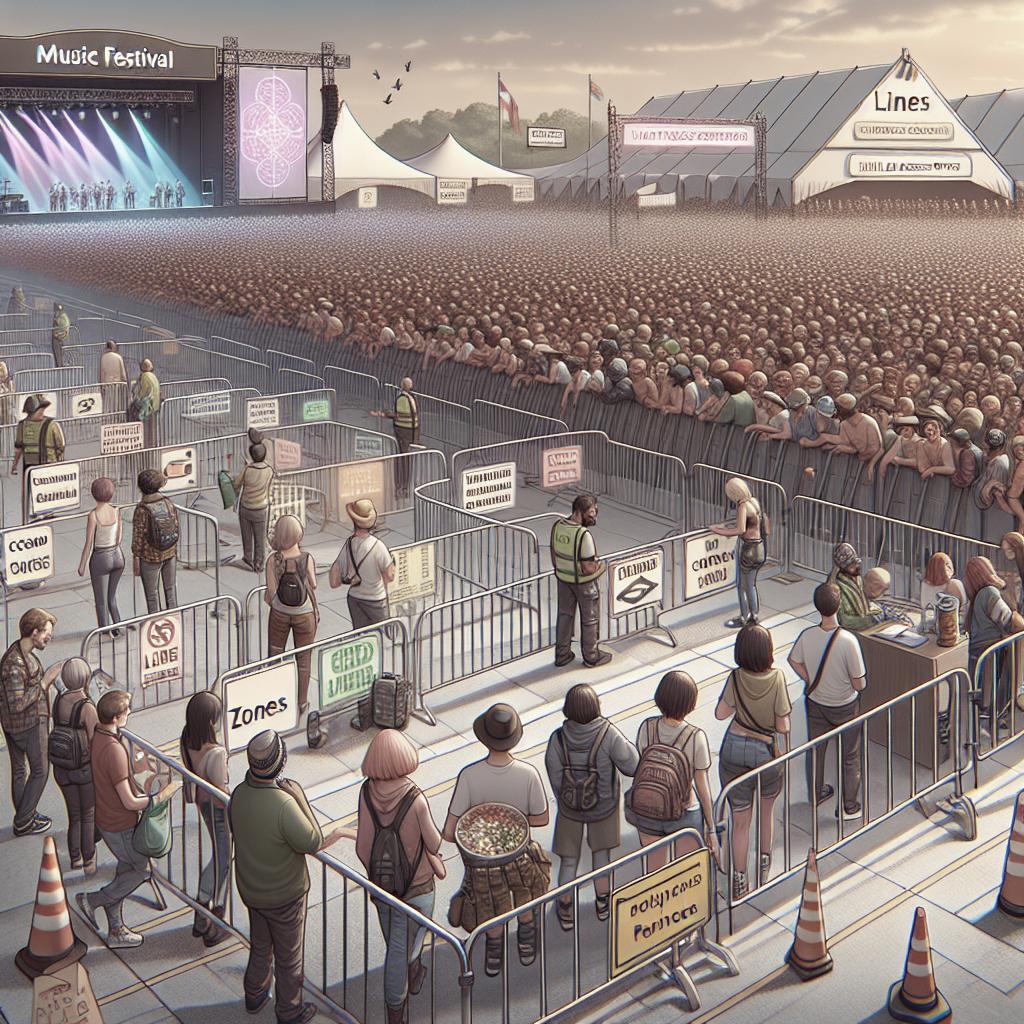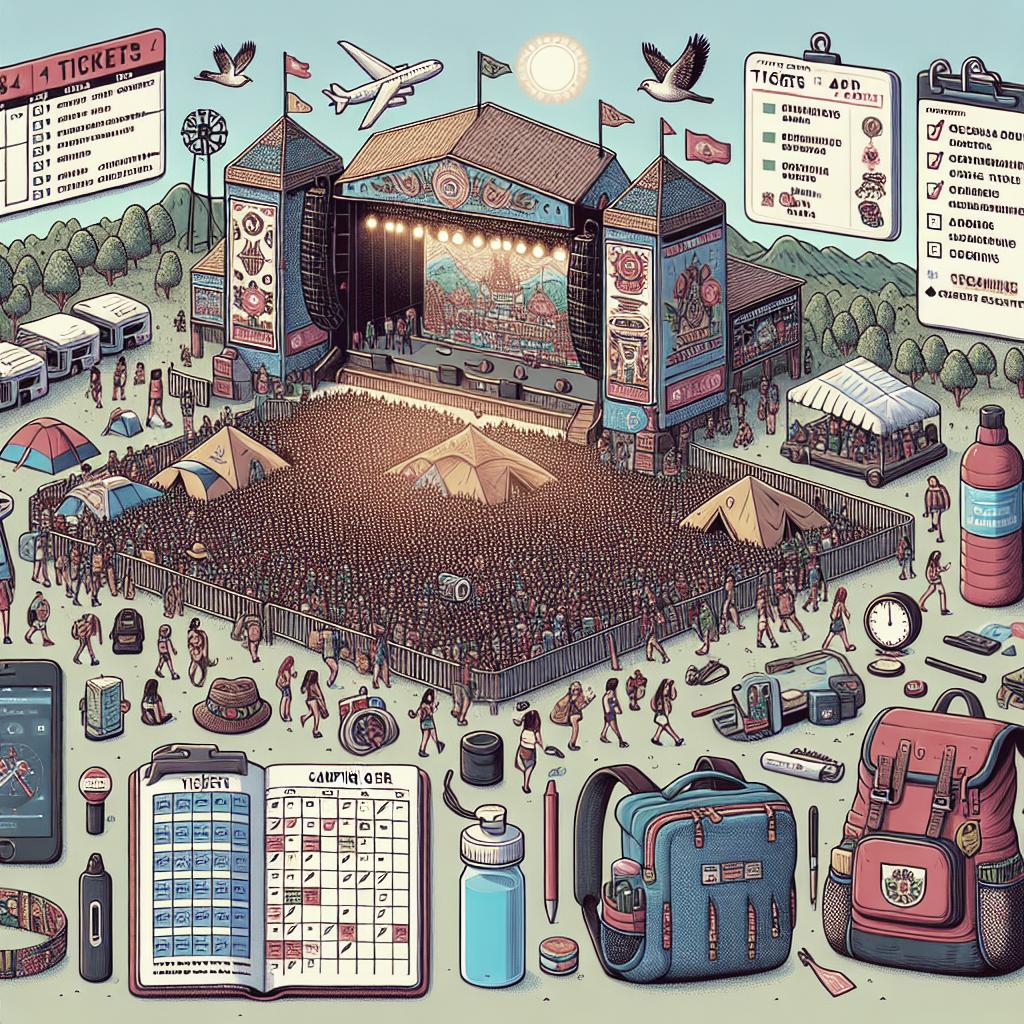<>
Music festivals are a haven for live music enthusiasts, creating unique experiences rooted in spontaneity and planned expertise. Yet one universal challenge persists: managing the lines. Efficient line management is paramount but often underestimated. This blog post will delve into the multifaceted strategies crucial for successfully navigating queues, from meticulously orchestrated plans to sophisticated technology integration and community engagement. We’ll explore the challenges faced and the rewards reaped, ponder the future trajectory of music festivals, and address frequently asked questions to equip you with practical insights for hassle-free event execution.
The Symphony of Planning
An exceptional music festival experience starts with meticulous planning, akin to orchestrating a symphony. Before staging the event, organizers must predict peak times, map logistics, and gauge attendee flow. Use historical data from past events to anticipate visitor volume and behavior. Spacing out high-demand acts and incorporating buffer zones can mitigate bottlenecks. Strategic placement of essentials—restrooms, food vendors, and merchandise stalls—also enhances flow. Implement an intuitive layout that minimizes long treks and disperses crowds. Detailed site maps should be shared with attendees beforehand, perhaps via an interactive app, helping them navigate with ease. Additionally, staggered entry times can optimize traffic. By offering incentives for arriving early or during off-peak hours, you can diffuse crowd density upon arrival. VIP or fast-pass lanes cater to varied preferences, effectively reducing mainline strain. Through careful pre-event orchestration, you lay the groundwork for a seamless festival experience.
Harmonizing Teams and Technology
Having a capable team harmonized with technology can strike the right chords in efficient line management. Training staff to be responsive and communicative ensures smooth crowd navigation. Clear on-ground coordination, backed by a tech-savvy command center, enhances situational responsiveness. Embrace technology for real-time monitoring. RFID wristbands streamline entry, making check-ins and purchases almost instantaneous. Meanwhile, mobile apps can provide dynamic event updates, weather alerts, and even queue lengths at various points, empowering attendees to make informed decisions. Virtual queueing systems prove indispensable. Implement an app that allows festival-goers to secure their place in line digitally, receiving notifications when their turn approaches. This minimizes physical wait times and gives attendees the freedom to enjoy more of the festival. Through the symbiotic relationship between a well-trained team and advanced technology, managing lines becomes a fluid and stress-free endeavor.
Cultivating Community and Sustainability
Community engagement can play a pivotal role in managing lines efficiently. Foster a culture of mutual respect and patience by setting the tone early, perhaps through festival guidelines emphasizing communal harmony and considerate behavior. Volunteers can facilitate smoother crowd management while enhancing the sense of community by providing assistance and information. Sustainability is another cornerstone. Eco-friendly practices like digital tickets reduce clutter and streamline operations. Encourage reusable merchandise, with incentives such as discounts or perks for attendees who bring their own items, diminishing waste and avoiding the need for additional waste management stations. A greener festival often means less chaos and quicker service times. Moreover, partner with local businesses and organizations to offer off-site activities or packages, spreading out the crowd and supporting the local economy. By fostering a strong community spirit and prioritizing sustainability, not only do you ensure better line management, but you also create a more enjoyable and responsible festival experience.
Facing the Music: Challenges and Rewards
Despite best efforts, managing lines at music festivals presents inevitable challenges. Unexpected surges, technical glitches, or poor weather can disrupt even the most well-laid plans. Flexibility and rapid response capabilities are essential to tackle these hurdles. Implement emergency protocols and ensure quick access to reinforcements. Yet, the rewards far outweigh the challenges. Smooth operations elevate the festival experience, fostering attendee satisfaction and loyalty. Positive reviews and word-of-mouth can significantly enhance your event’s reputation, resulting in increased ticket sales and potential sponsorships. Moreover, efficient line management translates to better time and resource utilization, enhancing profitability. Vendors experience better sales flow, artists get to perform without delays, and attendees connect more deeply with the event. The incremental improvements cull immediate frustrations and lay foundations for long-term success.
Encore: The Future of Festivals
Shaping the future of festivals involves continuous innovation and adaptation. Look to hybrid events that blend physical and virtual spaces, creating opportunities for larger and more diverse audiences. Virtual reality (VR) can offer unique experiences without adding to physical line congestion. Additionally, consider harnessing AI and machine learning to predict crowd behaviors more accurately and allocate resources dynamically. Interactive installations and smart infrastructure can further enhance visitor engagement while easing logistical pressures. Emerging trends like decentralized ticketing through blockchain technology might revolutionize entry management, making it more secure, transparent, and efficient. Staying abreast of these advancements ensures your festival remains relevant and poised for sustained success, leading the way in industry innovation.
Frequently Asked Questions (FAQ) About Music Festival Management
Q: How can I effectively reduce wait times at entrance gates? A: Use RFID wristbands, stagger entry times, and have well-trained staff to expedite check-ins. Q: What are some sustainable practices I can implement? A: Opt for digital tickets, encourage reusable merchandise, and partner with local businesses to offer off-site activities. Q: Is virtual queueing really effective? A: Yes, it allows attendees to secure their spot in line digitally, receive notifications, and reduces physical wait times. Q: How do I handle unexpected surges in the crowd? A: Have emergency protocols, flexible plans, and quick access to reinforcements to manage unexpected issues effectively. Q: What future technologies should I consider for better management? A: AI for crowd behavior prediction, VR for unique experiences, and blockchain for decentralized, secure ticketing. “`
| Section | Content |
|---|---|
| The Symphony of Planning | Importance of pre-event planning, using historical data, and spatial layout for optimizing crowd flow |
| Harmonizing Teams and Technology | Benefits of training staff and integrating technology like RFID wristbands and virtual queueing systems |
| Cultivating Community and Sustainability | Role of community engagement, promoting eco-friendly practices, and collaborating with local entities |
| Facing the Music: Challenges and Rewards | Addressing unexpected challenges, the benefits of efficient line management like attendee satisfaction and profitability |
| Encore: The Future of Festivals | Potential of hybrid events, AI, VR, and blockchain in revolutionizing festival experiences |
| FAQ | Common questions and answers related to festival line management and sustainability practices |
“`


